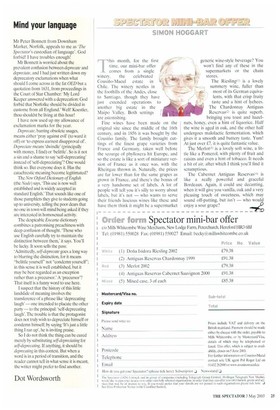Mind your language
Mr Peter Bonnett from Downham Market, Norfolk, appeals to me as 'The Spectator's custodian of language'. God forbid! I have troubles enough!
Mr Bonnett is worried about the prevalent confusion between deprecate and depreciate, and I had just written down my deprecatory.' exclamations when what should I come across in the fat OED but a quotation from 1631, from proceedings in the Court of Star Chamber: 'My Lord Keeper answered with a deprecation: God forbid that Norfolke should be divided in custome from all England.' Well! Koestler, thou shouldst be living at this hour!
I have now used up my allowance of exclamation marks for the year.
Deprecate, barring obsolete usages, means either 'pray against evil' (to ward it off) or 'to express earnest disapproval of. Depreciate means 'dwindle' (principally with money. I find) or 'belittle'. So is it not a sin and a shame to say 'self-deprecating' instead of 'self-depreciating'? One would think so. But everyone does it. Has the catachrestic meaning become legitimated?
The New Oxford Dictionary of English (the Node) says, 'This use is now well established and is widely accepted in standard English.' That sounds like one of those pamphlets they give to students going up to university, telling the poor dears that no one in town will mind being asked if they are interested in homosexual activity.
The despicable Encarta dictionary combines a patronising preachiness with deep confusion of thought. 'Those who use English carefully try to maintain the distinction between them,' it says. You'll be lucky. It soon sells the pass: 'Admittedly, self-deprecate goes a long way to blurring the distinction, for it means "belittle yourself' not "condemn yourself'; in this sense it is well established, but it may be best regarded as an exception rather than a precursor.' A 'precursor'? That itself is a funny word to use here.
I suspect that the history of this little landslide of meaning involves the transference of a phrase like 'deprecating laugh' — one intended to placate the other party — to the principal: 'self-deprecating laugh'. The trouble is that the protagonist does not truly wish to depreciate himself or condemn himself; by saying 'It's just a little thing I ran up', he is inviting praise.
So I do not think the thing can be cured merely by substituting self-depreciating for self-deprecating. If anything, it should be deprecating in this context. But when a word is in a period of transition, and the reader cannot tell in what sense it is meant, the writer might prefer to find another.
Dot Wordsworth










































































 Previous page
Previous page